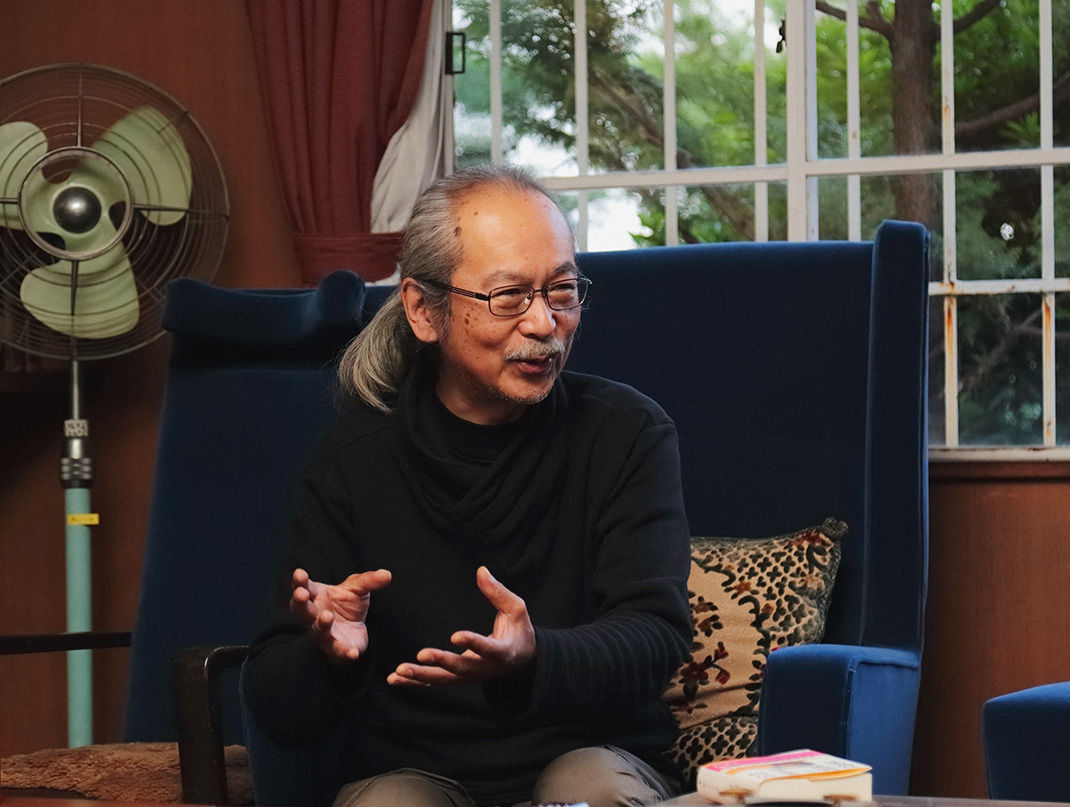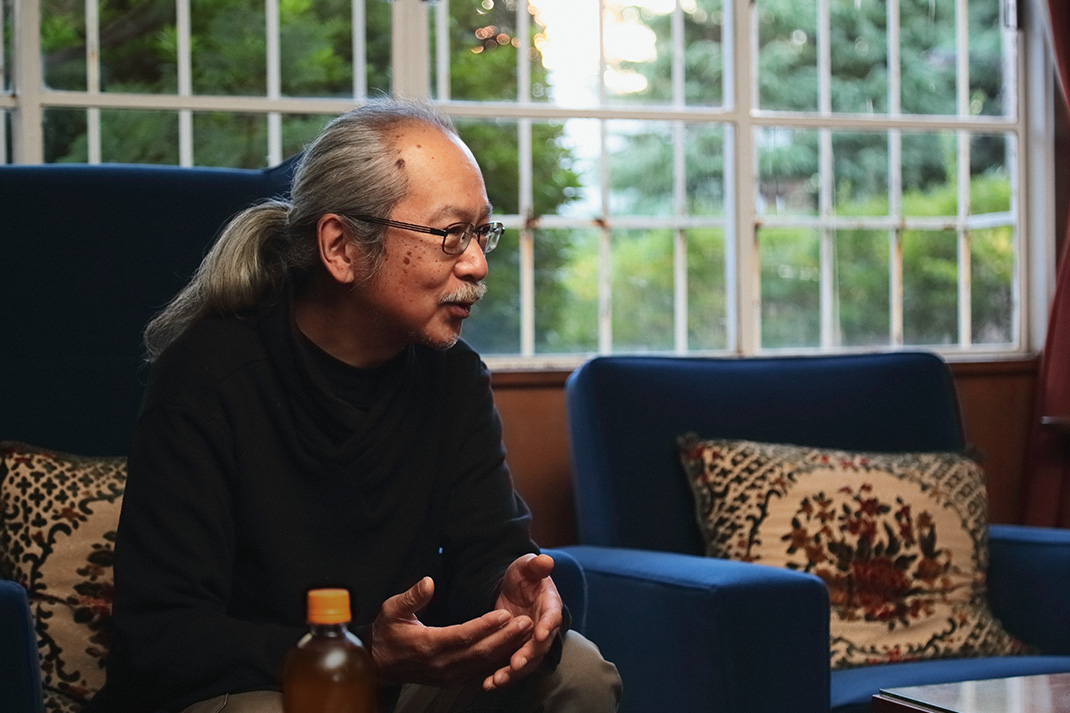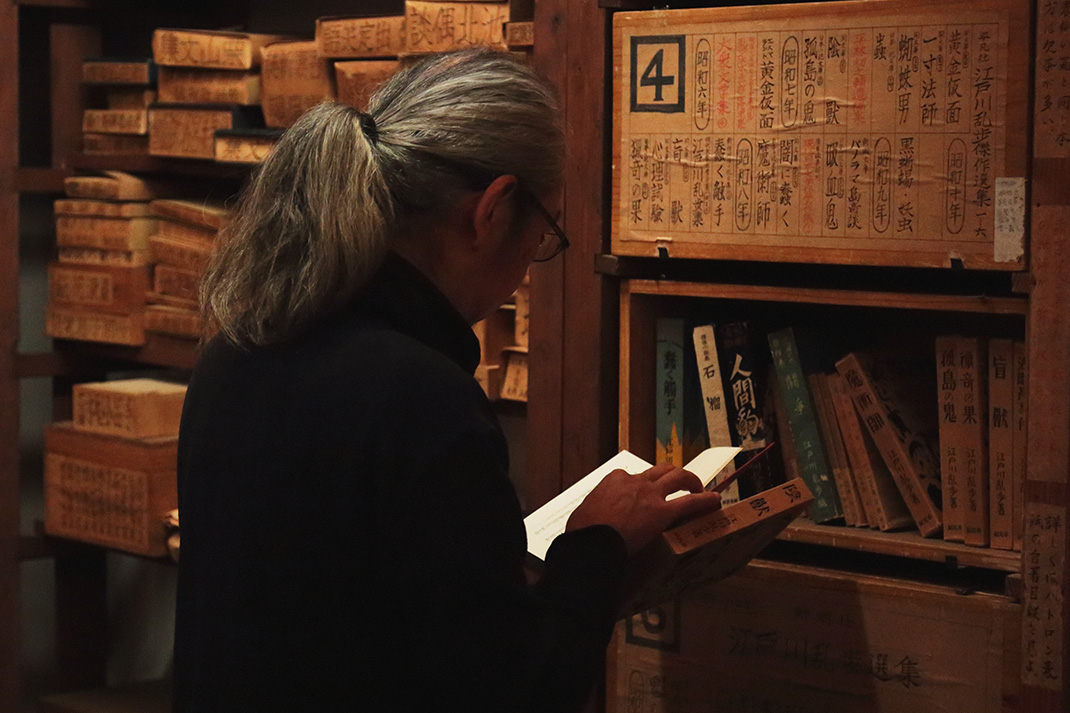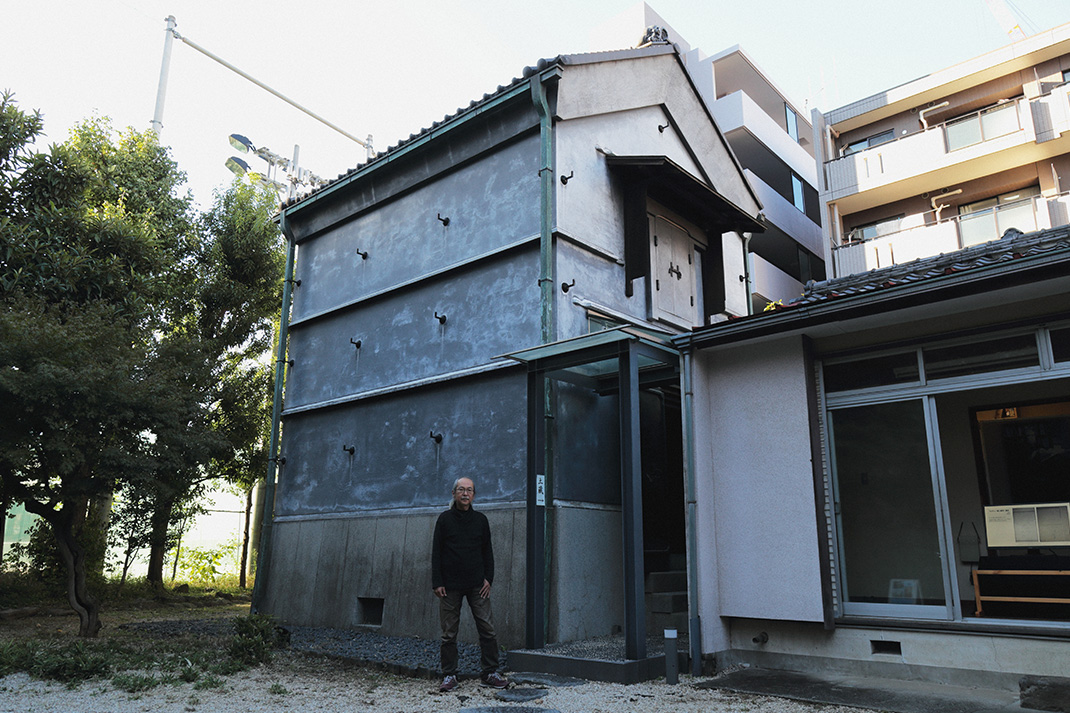Rampo x Hard Rock = NINGEN ISU
Shinji Wajima (NINGEN ISU)
Mar 06, 2023
OVERVIEW
Named after an Edogawa Rampo novel, the hard rock band NINGEN ISU (which translates to “The Human Chair”) was formed by members who love Rampo. The band has released numerous songs based on Rampo’s and others’ literary works. It is popular both at home and abroad as one of Japan’s leading hard rock bands. This time, we invited Shinji Wajima, guitarist and vocalist of the band, to the Edogawa Rampo Residence to share his unique view of Rampo and how he fuses Rampo’s works with rock music.
Rampo capturing the spirit of minorities

Wajima Our youth was during Japan’s bubble era. I think there is a cyclical boom in writers in the “Shin Seinen” area, but Edogawa Rampo was in a state where all his works were usually available in paperback.
Wajima That’s true. I had the impression that the writers of the time did not portray minorities. But Rampo’s novels depicted the spirit of minorities. It’s a counterculture, or rather, novels born out of the spirituality of non-mainstream people. So, the image is that young people who don’t reject mainstream culture but can’t get on board with it will always continue to read Edogawa Rampo. Suzuki (Kenichi) and I were both of that mentality, so we were reading writers from the “Shin Seinen” area.
Wajima Band names are basically in English. When we were in a band, there were very few people who named their bands in Japanese. That was odd, and if we name the band in English , it becomes the same as the others. We wanted to put forth our minority mentality, so we decided to come up with a band name in Japanese. So we thought about the detective novels we loved to read. It could have been Yokomizo Seishi or perhaps Yumeno Kyusaku. But I felt that Edogawa Rampo was pop, even in a counterculture way. That’s because everyone knew Rampo.
Wajima After that, I realized that not everyone knows Rampo (laughs). Many people don’t associate NINGEN ISU with Rampo. But we thought it was pop to give the band a Rampo’s title. So Suzuki and I were excited about it.
Wajima The process of thinking of a name is also enjoyable, which is why I intentionally took the long way. I thought up several candidates, but in the end, I thought NINGEN ISU fit the band the best. And it’s not descriptive. Moreover, it is a phrase coined by Rampo combining “Ningen (human)” and “Isu (chair),” isn’t it? In hindsight, I think there was no other choice.
Matching British hard rock with Rampo
Wajima There’s a typical pattern for the protagonists in his early short stories, isn’t there? He’s smart, but doesn’t fit into society. But he has his parents’ inheritance and doesn’t have to worry about money...In other words, a moratorium for a rich slacker. And we were the bubble generation, so we had a few years where we didn’t need to be overly intense about getting a job. So I linked the protagonist written by Rampo with the feelings of a depressed youth who did not fit in with the bubble-era vibe.
Wajima I thought it was a good idea. First of all, the premise is that hard rock and heavy metal have Christianity at their roots. So I thought that if I simply tried to do that just because I was inspired by foreign rock music, I would be hit a dead end in terms of lyrics. That musical style would just be borrowed or stylized without some kind of spice or backbone.
Wajima If I were to ask if we can express our music with Christian values, I would say that because we haven’t been around Christianity since childhood, singing about the Christianity we have studied wouldn’t be realistic or be understood by the Japanese people listening. We later added Buddhist elements. Our starting point, however, was that I thought it would be interesting to add the world of Japanese detective novels, even though it is entirely fictional, as our look. I borrowed NINGEN ISU for the band’s name because people would instantly understand it as a Rampo-esque world.

Wajima That’s true. Also, it is fairly common for these rock groups to take themes for their songs from novels. Take for example, Iron Maiden’s “Murders in the Rue Morgue” or Mountain’s “Flowers of Evil.”
Wajima You get more depth. We wanted to do it ourselves because we had an image of a worldview that would be twice as expansive. I thought it would be more Japanese to bring in a Japanese writer. So that’s the reason for Edogawa Rampo. Rampo is also pop, with a touch of counterculture, so I thought Rampo would be more rock than pure literature.
Turning Rampo’s works into songs
Wajima When we created the album “Shin Seinen (New Youth)” (2019), we decided to make songs full of titles taken from Rampo’s novels. “Kagamijigoku (Hellish Mirror),” for example. I composed this piece with an image first in mind, wondering how to express the feeling of light reflecting off a mirror and changing the substance in various ways in the chords. In writing lyrics, of course, the poem can’t be like the synopsis of a novel. Because it is definitely better to read that novel. When I create a song based on a novel, I borrow the setting and layer my own opinions into it while interpreting what I think the novel wanted to convey. That's usually how I write my lyrics. This might be very disrespectful toward the author…
Wajima It would be nice if it could be like a variation. On the original work.
Wajima I think about them separately. When I write songs based on the original works of Rampo and other detective novel writers, I try not to make them sound like pure literature.
Wajima Yes. Put simply, it’s whether or not there is humanism. When using Edogawa Rampo’s titles, if I put humanism in, it will destroy Rampo’s world. Rather, they are novels about people who know but can’t do anything about it. So when I write songs that borrow from Rampo’s novels, I try to write about the parts where people go off the morally correct path. But as a matter of fact, it’s tough for me when I write beyond that. That’s because there is no salvation.
Wajima Yes. I can't write anything that actually follows the immoral path. So I keep it within the inevitable state of mind. Or I want to write something like, “That's just a quip or joke,” and so I do. I like the back stories of the characters in his early works. Why does this person head toward crime? And the pattern is that the person eventually faces his doom. I write about the feelings of the protagonist whose doom is looming. I can’t write about the crime itself.
Edogawa Rampo is there in times of trouble
Wajima Oh, I couldn’t help (laughs). I want to express my gratitude once again, but it’s like Edogawa Rampo is there for me in times of trouble (laughs). I have been doing that for over 30 years. I have used quite a bit for tour titles until now (laughs).
Wajima Yes, that’s true. I usually name them “NINGEN ISU Best Selection.”
Wajima I can’t help but borrow from them (laughs).
Wajima It was the next album of “Shin Seinen” and I wanted to feature them like two sides of the same coin. If “Shin Seinen” is the head, “Kuraku” is the tail. Rampo also wrote quite a bit in “Kuraku.”
Wajima Oh, that’s right (laughs). First of all, I liked the phrase “Kuraku (pain and joy),” and the fact was also significant that the times started to enter a state of turmoil. I could sing simply about fear or love, but it somewhat feels like a lie. The real fear has completely exceeded the fiction, so we can’t compete with it. There is no way to put it in words. I have no option but to write about how I perceive reality in my own way, not being critical or political. I thought I had to use music to express how to live in this day and age.
Wajima Ah, yes. Music is a good form of expression taken from that perspective. It must be hard to do it in prose. Something about that person will inevitably pop up.
Wajima That’s something to think about. I’ll be sure to come and greet you when that happens (laughs).


Drawing Room of the Edogawa Rampo Residence/ October 26, 2022
Photos: Nozomu Suenaga
(The Edogawa Rampo Memorial Center for Popular Culture Studies, Rikkyo University)
Interview and text: Ryuki Goto
(Assistant Professor, the Edogawa Rampo Memorial Center for Popular Culture Studies, Rikkyo University)
*The content of the article is current as of the time of the interview and may not reflect the latest information.
*A full version of this interview will appear in Issue 28 of “Taishu-bunka” published by the Edogawa Rampo Memorial Center for Popular Culture Studies (to be published in March 2023).
RECENT TOPICS
Mar 02, 2026
Hiroshima Field Trip 2026
Master of Social Development and Administration (MSDA) Course
Profile
Shinji Wajima